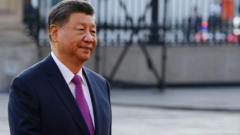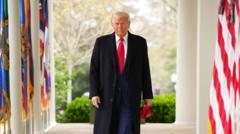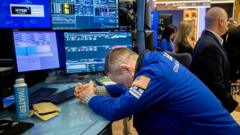As the United States wades into a new tariffs regime, experts debate the long-term implications on global trade.
# Tariffs and Trade: The Shifting Landscape of Global Economics

# Tariffs and Trade: The Shifting Landscape of Global Economics
The impact of President Trump's tariffs on international trade raises questions about the future of free trade dynamics.
In a dramatic announcement from the White House Rose Garden, President Trump unveiled a sweeping array of tariffs affecting over 100 countries, marking what he called a “liberation day” for the American economy. This decisive move mirrors past significant shifts in trade policy, notably Brexit, where Britain made the contentious choice to sever ties with the European Union. Analysts warn that Trump’s tariffs could significantly alter the landscape of global commerce, given the United States' pivotal role in the economic framework.
The reverberations of this development are expected to be even more profound than those triggered by Brexit, as the American economy stands as a titanic force in international trade. Nevertheless, economists caution that the long-term effects of Trump's tariffs remain uncertain. It is possible that he could retract these measures in response to market instability or in light of diplomatic negotiations.
Despite the potential chaos that could ensue from the U.S.'s retreat from free trade, many scholars believe that the overall momentum towards globalization may persist. The benefits of free trade have proven to be inherently compelling, suggesting that other nations might unite to maintain an interconnected trading system even in the absence of American leadership. Some proponents observe that the European Union remains intact and is exploring avenues for closer collaboration among its members despite the challenges posed by Britain’s exit.
“The era of unfettered free trade may face a setback,” remarked Eswar S. Prasad, a trade policy expert at Cornell University. “However, this scenario presents an opportunity for countries around the world to forge their paths and unite to promote free trade among themselves,” he added, cautioning that the immediate future could involve more self-serving actions from individual nations.




















